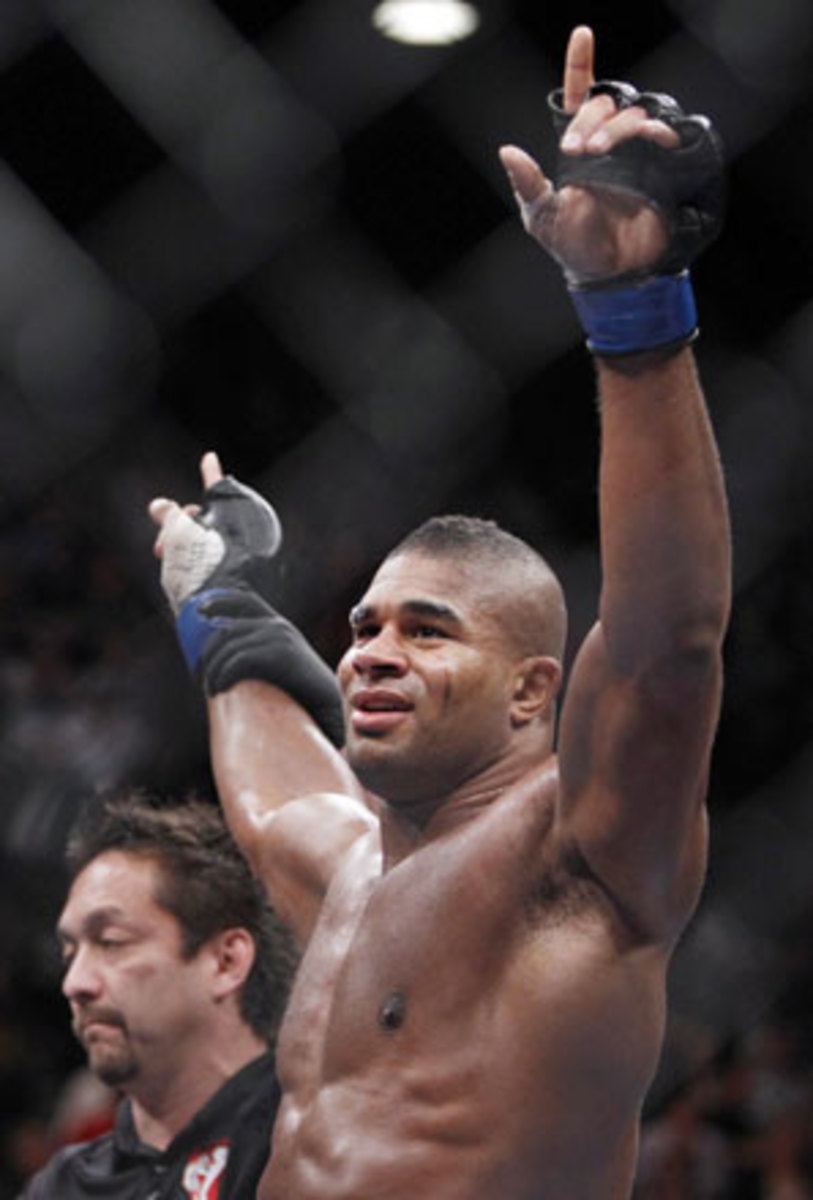Would-be UFC title challenger Overeem to go before commission


The most pivotal fight of Alistair Overeem's career will take place at a Nevada State Athletic Commission (NSAC) hearing on Tuesday in Las Vegas, when the UFC's No. 1 heavyweight contender answers to elevated testosterone levels detected in his system between bouts.
On Monday, Overeem revealed that he plans to explain away a 14:1 testosterone-to-epitestosterone ratio -- more than twice the NSAC's allowable 6:1 threshold -- by pleading ignorance.
"My doctor prescribed, and I accepted, an anti-inflammatory medication that was mixed with testosterone," he said in a prepared statement released by Authentic Sports Management. "I was completely unaware that testosterone was one of the ingredients in the medication."
In the statement, Overeem said he was given the medication to treat a re-aggravated rib injury on his left side "prior" to the day he was tested.
Overeem, the first combatant ever flagged in the NSAC's random, out-of-competition drug-testing program launched in July 2008, was one of six heavyweights asked to submit urine samples for drug screening following a UFC press conference on March 27 in Las Vegas -- a calculated deviation from the NSAC's usual random-testing routine.
Of the six athletes tested, Overeem's sample was the only one to come back irregular, showing a concentration of testosterone in his urinalysis much higher than the 1:1 and 2:1 ratios found in the average male. (Testosterone, produced by the body naturally, is also a building block of anabolic steroids and a banned substance in sports worldwide for its performance-enhancing properties).
Until a few days ago, Overeem was seeking his 2012 license to greenlight an already-announced heavyweight championship bout against titleholder Junior Dos Santos at UFC 146 on May 26 in Las Vegas. However, that career-apex fight was yanked late Friday night when UFC president Dana White announced that two-time former champion Frank Mir would replace the embroiled Dutch fighter instead.
"We were right up on deadlines for a lot of things we needed to do to promote a pay-per-view and I'm not very optimistic on Tuesday," White told the media following UFC 145 Saturday in Atlanta.
The UFC's turnaround (just two weeks ago, White had taken a wait-and-see stance until Overeem got his "due process") clearly distances the world's leading MMA promotion from Tuesday's anticipated drama. However, Overeem has no time to play the scorned fighter. There's much more on the line than a missed title shot.
If the 31-year-old fighter's explanation doesn't satisfy the commission, the NSAC will not only deny him a license to fight in Nevada for 2012; state regulations mandate Overeem won't be able to apply again for one year, until late April 2013. And there's a strong chance Zuffa wouldn't promote Overeem in another state and country for the next year to honor Nevada's decision.
However, the five-member commission has a lot more information to weigh than just Overeem's declaration.
Since last November, when he boarded a plane home for Holland just as NSAC Executive Director Keith Kizer reached out to his camp for his first random drug test with the agency, Overeem's interactions with the NSAC could be described as curious at best.
At an emergency hearing last December, Overeem, now home in Holland roughly three weeks out from a scheduled fight with Brock Lesnar at UFC 141 and still unlicensed, explained to commissioners via speakerphone that he'd left the country to care for his ailing mother. Blaming his camp for not getting the request to him fast enough during his transit, Overeem told commissioners he'd submitted to two drug tests in Holland with his personal physician, one six days (the wrong type of test required) and the other 20 days after the initial request had been made on Nov. 17. However, neither test was admissible because they hadn't been collected and processed by an approved-NSAC facility.
Now nearly a month after the Nov. 17 request date, the 31-year-old fighter was asked to take another test within 72 hours at an accredited European facility to gain a conditional license. The NSAC also stipulated that he'd be tested once he touched down in Las Vegas and then two more times randomly within six months (by June 30), which Overeem agreed to.
Overeem won his bout against Lesnar in dominant fashion and a title bout against champion Junior Dos Santos was announced in March. It was at the UFC press conference touting this fight eight weeks out where Kizer decided to get the first of the two post-fight random tests Overeem had agreed to for 2011 licensure.
In the past, Kizer would usually contact the fighter during his training camp as far as six weeks out and give him to the next midday to deposit his urine sample at a pre-approved facility in the fighter's area. But with Overeem, who'd switched camps and locations multiple times before leaving the country altogether prior to his last bout, Kizer said he couldn't take the logistical chance of missing him.
"That was a pretty unique and serious condition to put on his license," said Kizer. "Requiring him to submit two more tests between the Lesnar fight and his next fight was a pretty serious condition, so [the commission] obviously had some kind of concerns."
Another factor to consider, and one that was broached by the NSAC back at the December hearing, is Overeem's physical transformation. Overeem competed as a light heavyweight (205-pound limit) at Pride 33 in February 2007 in Las Vegas (and passed a post-fight drug test). In December, Overeem weighed in at 263 pounds against Lesnar.
Kizer said that Overeem's attorneys had already alluded that they might ask for a continuance Tuesday to give them more time to collect and present supporting information to bolster their client's claim. Kizer said if the commissioners honor that request, he'd anticipate them adding a condition that Overeem not compete anywhere until the hearing reconvenes at a later date.
